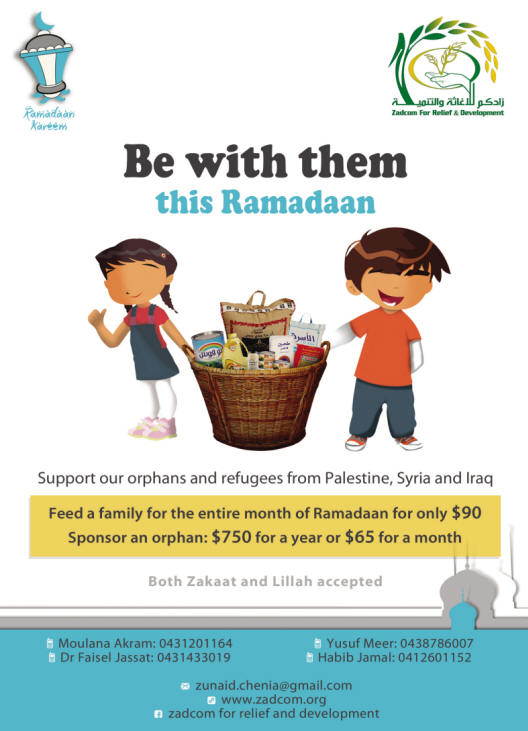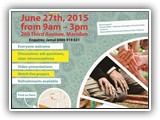|
| |
|
 |

Sunday, 14 June 2015
Newsletter
0553
|
MUSLIM AID AUSTRALIA
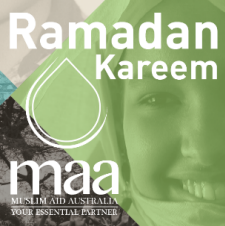
Click on image for more details
|
|
|
......a sometimes self-deprecating and
occasional tongue-in-cheek look at
ourselves and the world around us .....
Click a link above to go directly to
the article. Return to this section by
clicking To top at the bottom,
left of the article.
|
Ramadân
Kareem
This week
the crescent
of Ramadân
will once
again usher
in a month
of devotion,
fasting,
prayer and
charity
CCN wishes
all our
readers and
their
families and
friends
an uplifting
month of
peace and
prayer.
Ramadân
Mubarak
|
|
|
|
|
|
|
|
After a mammoth 18-month
effort to raise the $2.2M to
purchase the church
premises, the Slackscreek
Mosque (16 Queens Road,
Slacksreek) officially opens
on the Wednesday 17 June,
the start of the month of
Ramadan.
|
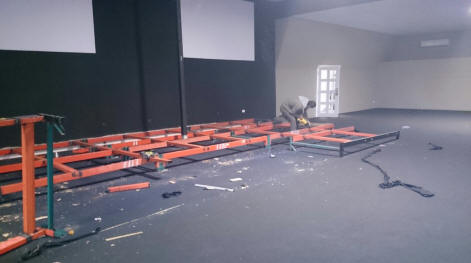
Volunteers start the clean
up and conversion of the
church to mosque process
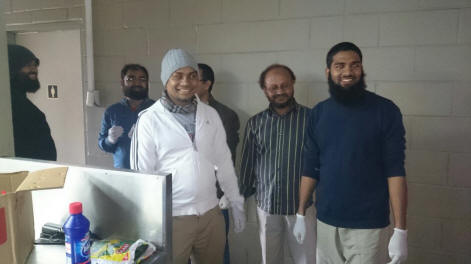 |
A collection drive is
underway for renovations, a
new wudhu area,
additional toilets and book
shelves.
BANK DETAILS: Suncorp ; BSB:
484-799 ; ACCOUNT#:
509169377
|
|
|
|
|
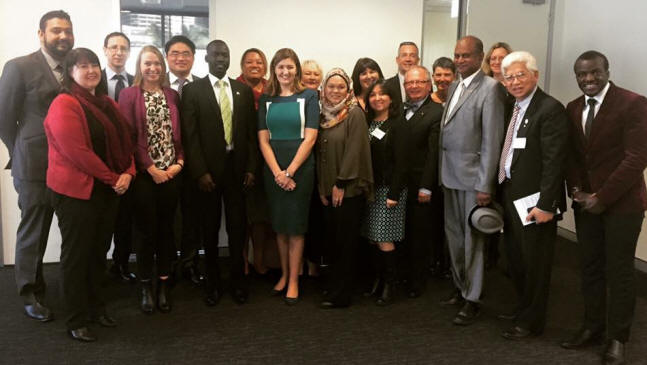
Interim committee
|
Representatives from across
Queensland’s ethnic
communities have met with
the Minister for
Multicultural Affairs,
Shannon Fentiman to discuss
the state’s multicultural
future as part of a new
group formed to advise the
Government.
Minister Fentiman said the
Palaszczuk Government was
committed to promoting
Queensland as a united,
harmonious and inclusive
community – a place where
the contribution of all
members of society was
valued and recognised.
“That’s why I am pleased to
announce the creation of a
Multicultural Community
Reference Group to advise me
on issues affecting
culturally and
linguistically diverse
Queenslanders,” she said.
The interim Reference Group,
made up of respected
community leaders and/or
experts on issues for
culturally diverse
communities in Queensland,
will operate until the
Multicultural Queensland
Advisory Council is formed
under the proposed new
multicultural legislation
next year.
“This is a great chance for
the members of this group to
help shape our multicultural
future and an opportunity
for me to listen to what
they have to say, especially
about the proposed
Multicultural Recognition
Bill, multicultural policy
and other significant
initiatives, ” Ms Fentiman
said.
Ms Fentiman encouraged all
Queenslanders to share their
ideas or issues affecting
their communities with the
reference group.
“I am committed to listening
to the community to ensure
government policies
recognise our diversity and
advance multiculturalism in
Queensland, and the
Reference Group will play a
key role in this,” she said.
The Interim Group members
are:
• Dr Nora Amath,
Chairperson of the
Australian Muslim
Advocates for the Rights
of All Humanity;
• Mr Ali Kadri,
Spokesperson for the
Holland Park Mosque;
• Mr Elijah Buol,
President
of the African
Communities Council of
Queensland;
• Professor Prasad
Yarlagadda,
President
of the Federation of
Indian Communities
Queensland;
• Ms Josephine Aufai,
Emerging leader of
Logan-based Pasifika
community;
• Ms Gitie House,
President
of the Toowoomba
International
Multicultural Society;
• Ms Helga Biro,
Executive
Director of Centacare
Cairns;
• Mr Michael Ma,
Secretary-General of the
Queensland Chinese
United Council;
• Ms Gail Ker OAM,
Director of the
Migration Council of
Australia and Chief
Executive Officer of
Access Community
Services Limited;
• Ms Kerrin Benson,
Chief Executive Officer
of the Multicultural
Development Association;
• Mr Serge Voloschenko,
Chairperson of the
Ethnic Communities
Council of Queensland;
• Dr Cuong Bui,
President
of the Vietnamese
Community in Australia -
Queensland chapter;
• Mr Jason Steinberg,
President of the
Queensland Jewish Board
of Deputies;
• Mr Paul Joseph,
Winner of
the 2014 Young Cultural
Diversity Ambassador
award and recognised
youth leader;
• Dr Homa Forotan,
2008 Young Queenslander
of the Year, former
President of the
Association of
Australian Tertiary
Students from
Afghanistan and
community advocate;
•Ms Cecilia Barassi-Rubio,
Director of the
Immigrant Women’s
Support Service.
|
|
|
|
|
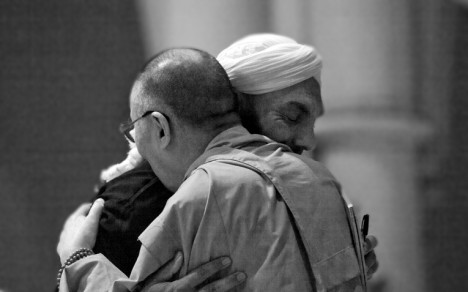
Associate Professor Mohamad Abdalla
hugs the Dalai Lama at a
multi-denominational gathering in
Brisbane. |
A humbling experience is how
Associate Professor Mohamad
Abdalla, Griffith University
Islamic Studies Director
described his meeting with
His Holiness the 14th Dalai
Lama.
Dr Abdalla presented the
response to the Dalai Lama’s
address to a
multi-denominational
gathering aimed at world
peace at St Stephen’s
Catholic Cathedral in
Brisbane on June 11.
The ceremony was attended by
900 people, including Bahai,
Buddhist, Hindu, Jewish,
Islamic, Sikh and
Christians, all of whom the
Dalia Lama urged to pray for
world peace.
“The
Dalai Lama
is extremely
modest and
gentle, and
to be at a
gathering
with
Archbishop
Mark
Coleridge
and heads of
various
religious
bodies was
very
humbling for
me,’’ Dr
Abdalla
said.
|
“The Dalai Lama reminded us
that world peace must
develop from inner peace.
Peace is not just the
absence of violence but also
the manifestation of human
compassion.”
“He said building
inner-strength and trust was
the key to building peace
and compassion.”
In a break with protocol at
the start of the ceremony Dr
Abdalla and the Dalai Lama
together led the procession
into the cathedral.
“I was talking to him
outside and he just grabbed
my hand and led me inside
the cathedral. Indeed it was
a fortuitous moment,” Dr
Abdalla said.
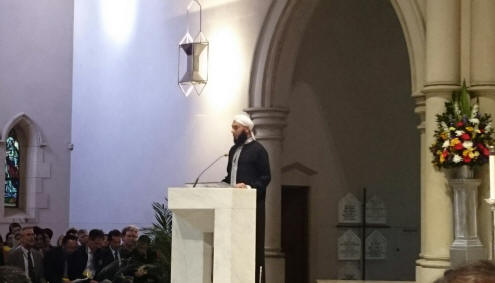
Before he spoke, Dr Abdalla
turned to the Dalai Lama and
gave him a big hug. He then
thanked him for spreading
his message of forgiveness
and peace at a time when it
was most needed.
“His statement that we are
all of the same origin
reminds me of the prophetic
dictate; ‘Your lord is one,
your father is one, and so
there is no virtue of a
black person over a white
person…all are equal in the
esteem of God’.
“Building a culture of peace
and harmony does not apply
only to distant, warring
regions, but also to our own
society.
“By seeking to better
understand the social,
political, cultural,
economic, and civic
structures whose
deterioration can lead to
violence and social
upheaval, we can contribute
to the identification of and
support for measures to
restore and enhance
harmony.”
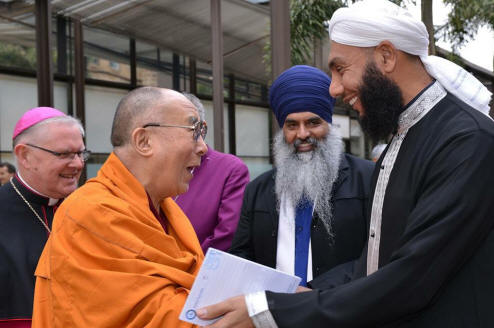
Source:
Griffith University
|
|
|
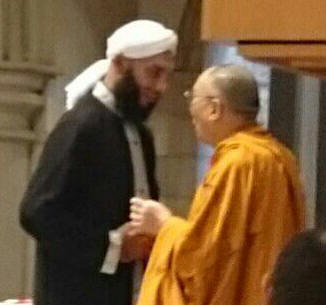
Associate Professor Mohamad
Abdalla, the director of
Islamic Studies at Griffith
University and an imam at
Kuraby Mosque, said he was
"humbled" to respond to the
"wise and sacred words" of
the Dalai Lama on behalf of
the multi-faith
congregation.
"There is no doubt that the
promotion of harmony,
especially religious
harmony, is of great
significance and thank you
so much for reminding us of
that.
"The world today is need of
people like yourself."
|
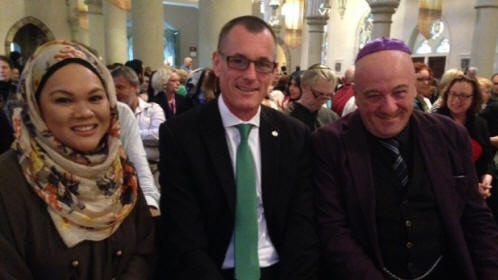
Muslim advocate Nora Amath,
Christian David Forbe and Jewish
community member Shimon de Valencia
at multi-faith prayer event in
Brisbane attended by the 14th Dalai
Lama. |
After the Dalai Lama's
speech, representatives from
the world's different faiths
led the congregation in
prayer.
The representatives were; Dr
Janet Khan, national
spiritual assembly of the
Bahais in Australia, three
representatives from Sri
Lanka's Theravada Buddhist
Tradition, Surendra Prasad
OAM from Hindu Council of
Australia, the president of
Queensland Jewish Community
Services* Ariel Heber,
Venerable Chueh Shan from
the Chung Tian Buddhist
Temple, Kuraby mosque imam
Mohamad Abdalla, director of
the Sikh Nishkam Society of
Australia Ranjit Singh and
Brisbane's Anglican
Archbishop, Dr Phillip
Aspinall.
Muslim Nora Amath, Christian
David Forde and Jew Shimon
de Valecia sat together in
St Stephen's Catholic
Cathedral and all praised
the event.

We talk
about world
peace but
actually
coming
together and
networking
and being
the
'bridge-builder'
between all
of us is
worthwhile
with all the
conflict in
the world.
 –
Dr Nora
Amath –
Dr Nora
Amath
|
David Forde said all forms
of negativity had to be
overthrown.
"We need to promote the
positive stuff and celebrate
it."
Shimon de Valencia said
seeing people of different
faiths sitting together
talking and smiling was
something the world
"desperately needs".
"And we can sit here
unifying so many different
layers of division."

Brisbane Times
|
|
|
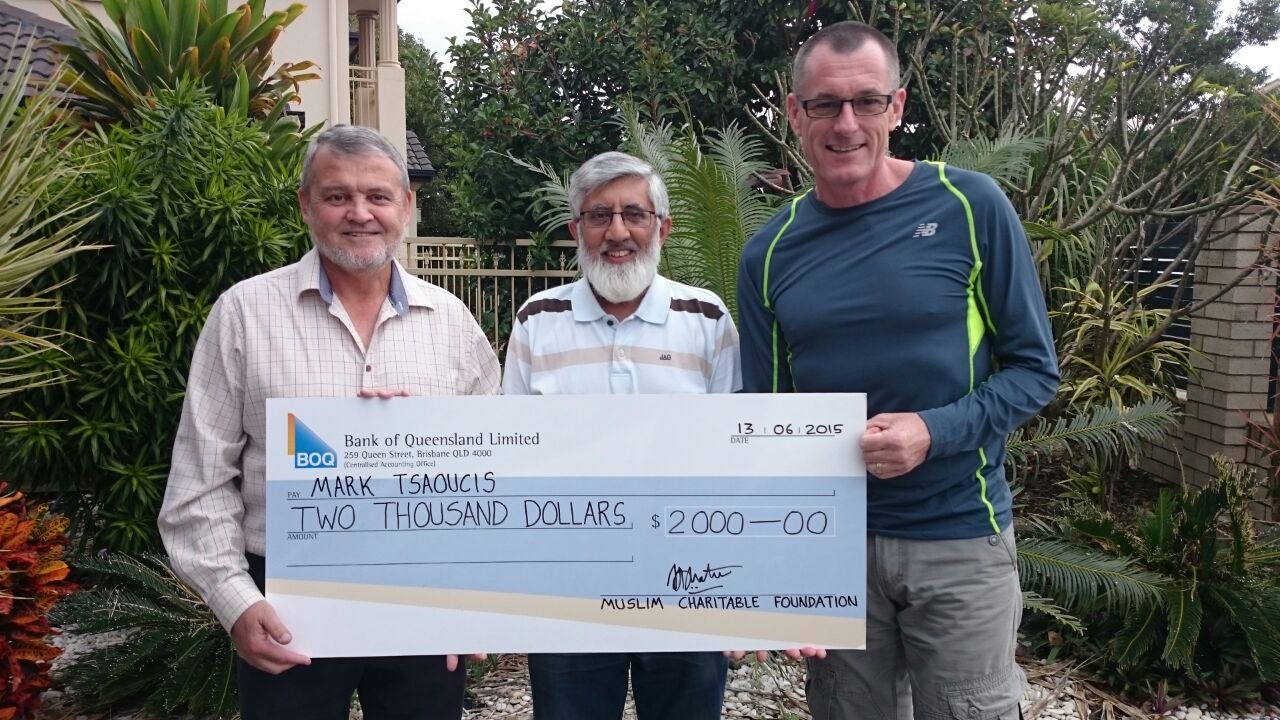
Osman
Rane and Yusuf Khatree of MCF
present David Forde with a cheque
of $2,000 to support his Brisbane
100km ultra marathon run on 16
August 2015.
David
hopes to raise $10,500 to assist a
14 year old Kuraby boy Mark Tsaoucis
(pictured below) who has severe Spina Bifida.
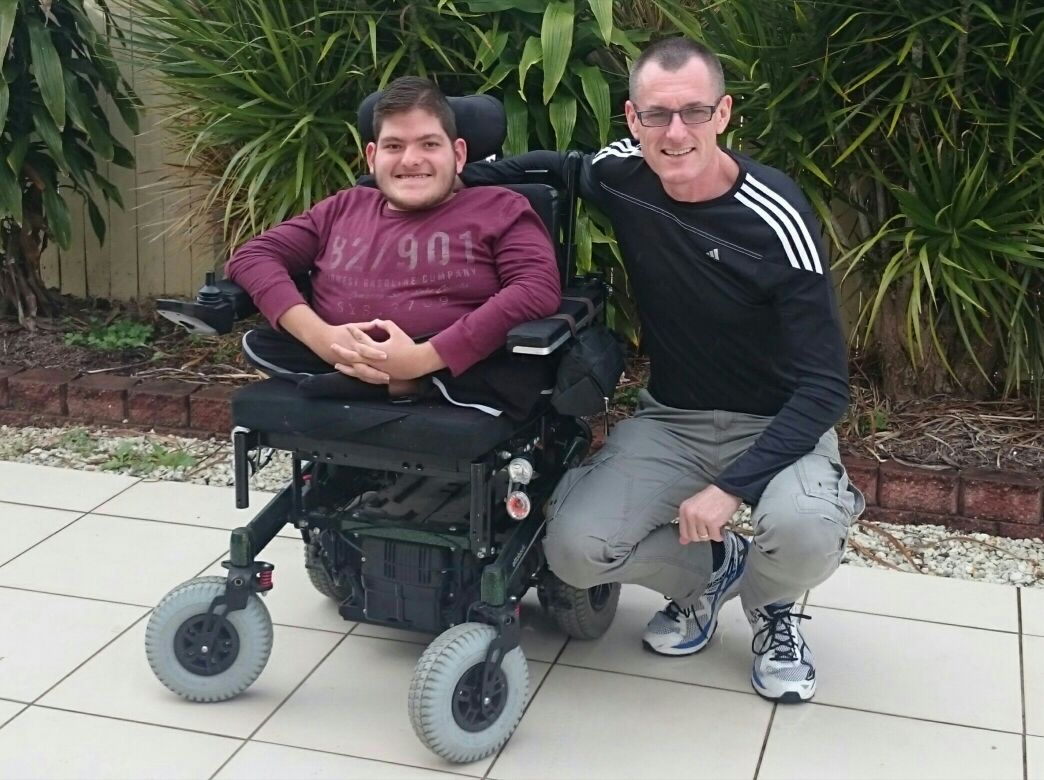
This
is part of $30,500 needed to modify
his bathroom. The family have raised
$10,000 and $10,000 has come from an
NGO.
“I am
most grateful for the generosity
from MCF as I know the Mark’s family
are. Over the years the Muslim
community has been consistently
supportive of those less fortunate
and you are a credit as fellow
Australians”, said David.
You
can contact David on 0413 874 008. |
|
|
|
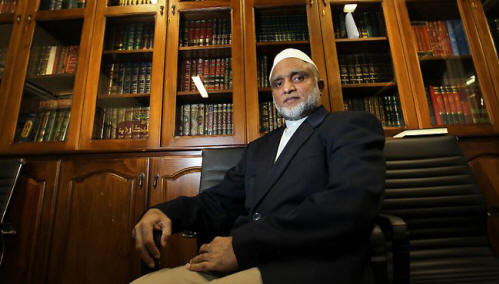
Defence has appointed a
Muslim cleric to its
religious advisory panel,
even though there are under
100 Muslims in the defence
force.
Assistant Defence Minister
Stuart Robert said Imam
Mohamadu Nawaz Saleem
(pictured above) would
join the Religious Advisory
Committee to the Services
which provides a link
between the Australian
Defence Force and the
governing bodies of faith
groups.
It now consists of five
members from the Christian
faith, one Jewish member and
one Muslim member.
He will work with the Muslim
community and other members
of the RACS in providing
advice on the religious and
spiritual wellbeing of all
members of the ADF.
Mr Robert said Imam Saleem
was nominated by the
Australian National Imams
Council and was a highly
experienced Muslim cleric
with formal qualifications
in law and academia.
He is also an Associate
Chaplain with the Victoria
Police.
Mr Robert said defence
needed to widen its
recruitment pool and tap
into a culturally and
linguistically diverse
workforce.
“Increasing the breadth of
the RACS to include the
Muslim faith also reflects
the ADF’s pastoral care
responsibilities for all its
members and is entirely
consistent with Defence’s
commitment to cultural
reform,” he said in a
statement.
Source:
The Australian
|
|
|
The Australian Government is
inviting submissions on
proposed changes to the
Citizenship legislation.
A discussion paper,
Australian Citizenship –
Your Right, Your
Responsibility, has been
developed by Senator the Hon
Concetta Fierravanti-Wells,
Parliamentary Secretary to
the Minister for Social
Services and Parliamentary
Secretary to the
Attorney-General, and The
Hon. Philip Ruddock MP
Special Envoy for
Citizenship and Community
Engagement, "to encourage a
national conversation about
these important issues".
The discussion paper is
available on the Australian
citizenship website
www.citizenship.gov.au.
For more information
click here.
|
|
|
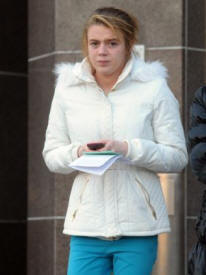
Jailed: Paige Bain, 16, was
sentenced to two years and eight
months for her part in the racist
attack in which a pregnant woman was
punched and a Sudanese woman had her
hijab pulled off |
A teenage thug has been
jailed for her part in a
racist attack in which a
Sudanese woman had her hijab
headscarf pulled off.
Paige Bain, 16, also
repeatedly punched a
five-months pregnant woman
during the assault, which
was carried out with her
aunt, Eileen Kennedy, 28.
Umaimi Musa, from Darfur,
Sudan, and her Congolese
friend Mary Marandran were
sitting in a playpark in
Royston, Glasgow, in
September last year when
they heard foul-mouthed
racist insults being hurled
at them. They were then set
upon.
The incident was captured on
CCTV and the camera operator
raised the alarm with police
as the attack happened.
Sheriff Kenneth Mitchell
sentenced Bain to two years
and eight months in prison
for the attack.
Kennedy was earlier jailed
for two years and six days
for her part in the assault.
The then 15-year-old and
Kennedy, pleaded guilty at
an earlier hearing at
Glasgow Sheriff Court to
racially assaulting
41-year-old Miss Musa to her
injury.
Kennedy also admitted
resisting arrest and
claiming she had an
infection before spitting on
a police officer.
Bain admitted racially
aggravated assault on Mrs
Marandran, 40.
Procurator fiscal depute
Mark Allan, prosecuting,
said: ‘Bain, repeatedly
punched the then pregnant
Mrs Marandran on her head
and pushed her.’
He told the court that both
accused demanded Miss Musa’s
mobile phone and tried to
grab it off her after she
told them she was going to
call the police.
Source:
The Daily Mail AUSTRALIA
|
|
|
 A
Federal Liberal MP is
worried about the level of
racism towards Muslims in
Australia and says it must
be tackled to curb violent
extremism. A
Federal Liberal MP is
worried about the level of
racism towards Muslims in
Australia and says it must
be tackled to curb violent
extremism.
Queensland MP Ewen Jones
(pictured right)
recently signed a letter
supporting the Government's
push to strip dual nationals
of their Australian
citizenship if they are
involved in terrorism.
He said he did so on the
condition no-one would be
left stateless.
But Mr Jones said society as
a whole has a responsibility
to tackle violent extremism
and that racist attitudes
did not help.
He said he was disturbed by
the level of racist hate
mail he had received
directed at Muslims.

I am very,
very worried
about the
latent, for
want of a
better term,
racism, that
we are
seeing in
the country
when it
comes to our
Muslim
population
 –
Ewen Jones –
Ewen Jones
|
"I'm still getting people
sending me stuff saying,
'what about these bloody
Muslims' and you go back to
them and say. 'you know
that's a false story'."

ANC News
|
|
|
|
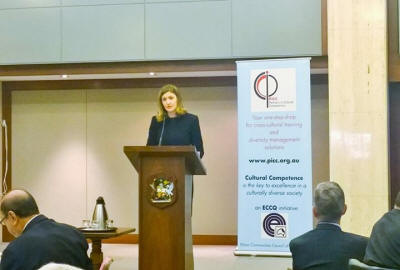 |
The
Ethnic Communities
Council of
Queensland (ECCQ)
hosted a breakfast
this week with Ms
Shannon Fentiman, MP
for Waterford,
Minister for
Communities, Women
and Youth, Minister
for Child Safety and
Minister for
Multicultural
Affairs. |
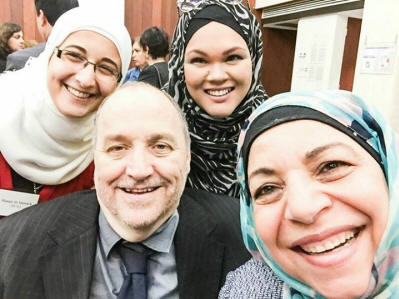 |
 |
|
|
By Ahmed Shaikh
|
In the Los Angeles area, one
of three “pilot program
cities” for Countering
Violent Extremism (CVE),
advocacy for it inside the
Muslim community has failed.
It is likely to fail
elsewhere.
This result should have been
self-evident. Anyone who
believes Muslims will simply
accept becoming second-class
citizens more prone to
violence than other faith
groups is living in an
orientalist dream world.
Opposition to the program
was overwhelming from the
get-go. The Islamic Shura
Council of Southern
California, representing
almost all significant
Muslim organizations in the
Los Angeles region, voted
unanimously against CVE in
February, citing fears of
surveillance, racial and
religious profiling.
To the extent community
“buy-in” was needed, the
program was dead in Los
Angeles. But, as a brand for
the anti-terrorism industry
in Washington D.C. and
international capitals
(living off the government
trough), it is alive and
well.
Many individual Muslims were
eager to promote the
program. CVE promoters do
not exist in other faith
communities or demographic
groups, since there is no
ecosystem of governments and
no think tanks interested in
amplifying the voices of
such promoters.
Distinguishing themselves
from other community
organizations, the Muslim
Public Affairs Council (MPAC)
supports CVE (MPAC is a
leading member of the
Islamic Shura Council but
did not participate in the
vote on the program).
It is unlikely anyone at
MPAC truly believes Muslims
should be second-class
citizens and are uniquely
scary. So, how could they
get this so wrong?

altMuslim
|
|
|
|
|
|
By Daisy Dumas
|
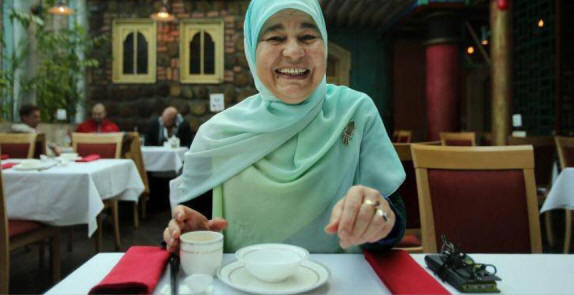
Maha Abdo, president of the Muslim
Women's Association: "There was no
fear before the media created the
fear." |
When Maha Krayem Abdo bends
in duha prayer shortly after
sunrise every morning, she
first asks for protection.
"And I don't mean just for
me and my family," she
explains, gently shaking her
head. She means for
Australia.
"I sometimes wake up and
listen to the early news and
think, 'God, make today a
better one than yesterday.'
I don't want my
grandchildren to go to
school feeling ostracised,
feeling that they do not
belong as a second
generation of Australian
Muslims."
The head of the Muslim
Women's Association, current
NSW Human Rights Ambassador,
mother to four and
grandmother to nine has
reason, perhaps, to entreat
the powers on high. She is
all too used to dealing with
politicians whose mandate
appears to have settled upon
building social barriers
rather than bridges. These
days the 56-year-old
daughter of the co-founder
of Sydney's first mosque no
longer enjoys walking alone.
When she arrived in Sydney
in 1970, she thought nothing
of being by herself as she
explored the ocean-front
near her home in Coogee.
Now, wearing the
unmistakably Islamic sign of
a hijab, she prefers to walk
along George's River with
her husband, for safety's
sake.
"You
look around
and no
matter where
you are and
what you
are, at the
moment being
an
Australian
Muslim woman
is not an
easy image
to carry.
You're
continuously
feeling the
need to
justify why
you put that
piece of
cloth on
your head,
why you eat
halal food."
|
A fish tank, well beyond its
prime, bubbles behind us as
our meal arrives – two $12
plates of Imperial Jade
Palace's lunch specials,
jasmine tea on the side. The
Bankstown Sports Club is an
unlikely venue for our
interview (I'd rather looked
forward to Mezze). But Maha
is squeezing me into her
schedule, and today she's
come to the Disney-like
complex to speak at a local
domestic violence meeting,
linking to her work with
MWA's Going Home Staying
Home project, Linking
Hearts. Targeting all women
victims of domestic violence
in Canterbury Bankstown, it
recently won a $1.8 million
state government tender.
Maha picks the prawns from
her curry and politely
leaves the remainder as
staff fret over the
approaching closing time.
"For
me, as a
woman of
faith, I see
that people
are so angry
with
something.
Instead of
looking at
the source
of the anger
and the
frustration,
it's easier
to blame,"
she
continues.
"Muslims are
blamed for
every ill
that is
about now."
|

Border Mail
|
|
|
There's an organization
responsible for more
terrorism plots in the
United States than al-Qaeda,
al-Shabaab and ISIS
combined: The FBI. How? Why?
In an eye-opening talk,
investigative journalist
Trevor Aaronson reveals a
disturbing FBI practice that
breeds terrorist plots by
exploiting Muslim-Americans
with mental health problems.
|
|
|
Mostly, Muslim students are
taught about inventions and
discoveries of Muslims and
they list hundreds and
thousands year old
inventions by Muslims.
But one important fact needs
to be highlighted that
Pakistani scientists, too,
have a great contribution in
where the world is standing
today.
There are hundreds of
capable scientists which
have worked on prestigious
scientific missions and many
of them even have invented
numerous things in their
disciplines.
This list of greatest
Pakistani scientists prove
that Pakistan is not far
behind anyone in development
of today and has a
contribution in the modern
world.
Even though resources in the
country are minimal, yet
these brilliant minds were
stronger enough to take over
the circumstances.
4)
Abdus Salam
Abdus Salam was a Pakistani
theoretical physicist who
won a Nobel Prize in Physics
for his contribution to
'electroweak unification' in
1979. He is the first
Pakistani to receive a Nobel
Prize.
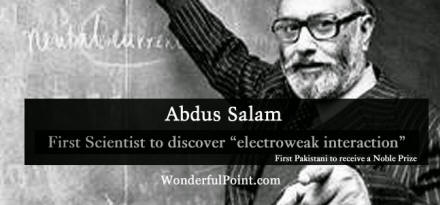
NEXT WEEK:
Sultan Bashiruddin
Mahmood
Source:
WonderfulPoint
|
|
|
|
|

Ramadan in Sweden with no
dusk, no dawn
|
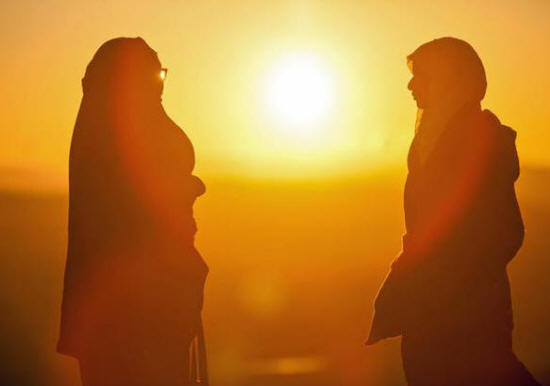
Midnight sun prevails from May
28-July 16 in Kiruna, which covers
more than half of the fasting period
this year. |
Kiruna, Sweden - During
this year's holy month of Ramadan, when
consumption of food and water is
prohibited between dawn and dusk, how do
Muslims observing the fast manage in the
far north of Scandinavia, where the sun
never sets?
An estimated 700 Muslims are spending
Ramadan in the mining town of Kiruna,
located 145km north of the Arctic Circle
and surrounded by snowcapped mountains
throughout the summer. Many of them are
recent asylum seekers, sent to Kiruna
while their claims are processed.
The sun stays up around the clock from
May 28-July 16, which constitutes half
of the fasting period this year.
"I started Ramadan by having suhoor with
the sun shining in my eyes at 3:30 in
the morning," said Ghassan Alankar from
Syria, referring to the meal just before
dawn.
"I put double curtains in my room and
still, there's light when I'm going to
sleep."
Since there is no central authority in
Sunni Islam that could issue a definite
religious ruling, or fatwa, Muslims in
the north are using at least four
different timetables to break the fast.
Alankar sticks to Mecca time, Saudi
Arabia, "because it's the birthplace of
Islam". But he is worried about whether
his fast will be accepted by God.
"I'm not sure I'm doing the right
thing," said Alankar, who arrived in
Kiruna seven months ago after a
hazardous journey via Lebanon, Turkey,
and Greece. "Only when I'm in God's
house, if I make it to heaven, I will
know."
No dusk, no dawn
The start of Ramadan is determined by
the sighting of the new moon, which
moves about 11 days back in the
Gregorian calendar each year. About
every 33 years, Ramadan falls at the
same time.
A majority of those who fast in Kiruna
follow the timings of the capital
Stockholm, 1,240km further south, after
being advised by the European Council of
Fatwa and Research (ECFR), a
Dublin-based private foundation composed
of Islamic clerics.
"In Stockholm, there's day and night,"
Hussein Halawa, secretary-general of the
council, told Al Jazeera, explaining the
decision. He was personally invited to
northern Sweden from Dublin this year to
experience the lengthy daylight and give
advice.
Idris Abdulwhab, from Eritrea, follows
the ECFR fatwa, which means his longest
period of fasting will be 20 hours.

Zero,
15, 25 or 45
hours, it
doesn't
matter as
long as you
believe in
what you're
doing. But
we're human
beings; of
course it's
hard
sometimes.
 Hussein
Halawa,
European
Council of
Fatwa and
Research Hussein
Halawa,
European
Council of
Fatwa and
Research
|
One of those who has chosen to fast
according to the local prayer times
listed online is Fatima Kaniz. In a
homely apartment overlooking mountains
and mining facilities, she prepares a
Pakistani fast-breaking dinner, or Iftar,
for 8:30pm as the persistent sun
penetrates the window blinds. Oil
sizzles in a pan as she drops in pakoras,
a vegetable snack made with chickpea
flour.
She recalls her first day in Kiruna five
years ago, in June.
"I waited for the sun to go down so I
could pray maghreb," she said, referring
to the sunset prayer. "I waited until
3am, until my Chinese roommate at the
asylum centre found me and explained it
was pointless to wait. I thought, 'What
kind of strange place is this?'"
The fare of the day consists of the
Pakistani Ramadan staples chapati and
pakoras served with raita, with the
addition of Swedish fish fingers and
lentil stew.
During two-thirds of Ramadan, following
the Kiruna prayer times means that Kaniz
fasts for about 18 hours. But due to the
sun's movements, she will fast for a
whole 23 hours during one of those days.
"I live in Kiruna, and I pray according
to Kiruna time all year round. Why
should I change this during Ramadan and
suddenly follow Stockholm?" she asked.
She followed the same system during four
previous Ramadans - the last one also at
the height of summer.
"Sometimes I got tired and took the bus
home from work instead of walking, but
otherwise, I felt fine," she said. "But
I looked at the clock many times."
The weather in Kiruna varies widely
during the summer months. Within a day,
25 degrees Celsius and sunshine can turn
into 10 degrees and pouring rain.
December Ramadan: Perpetual darkness
When Ramadan falls in December, however,
Muslims will face the opposite of
midnight sun: polar night. For two
weeks, the sun does not rise above the
horizon.
"Why don't they come to me to ask about
Ramadan then?" asks Halawa of the ECFR.
He said a conference will be held later
this year to issue a winter timetable
for both fasting and prayers.
Muslim prayer times also follow the sun
- which means that during winter, all
five prayers can fall within a time span
of two hours.
Abdulnasser Mohammed, of Somali origin,
was new to Sweden and Kiruna the last
time Ramadan fell under the Midwinter
night, in 2000.

There
was no
really
established
Islamic
organisation
at the time,
or
information
on the
internet. I
had to make
up my own
rules. I
fasted for
about five
hours.
 Abdulnasser
Mohammed,
chairman of
the Islamic
association
in Kiruna Abdulnasser
Mohammed,
chairman of
the Islamic
association
in Kiruna
|
Mohammed, who is now the
chairman of the Islamic association in
Kiruna, follows the fasting times of
Istanbul in the summer, since Turkey is
the Muslim country closest to Sweden.
But he explains, in his view, everyone
is free to choose.
"Islam isn't rigorous," he said.
"Ramadan is not about starvation or
about inflicting injury on yourself.
People must choose what works for them."
Apart from the Syrians, who have fled
the war in their homeland, Eritreans
form the largest Muslim community in
Kiruna.
Hawa Fidel and Alia Hassen host a
plentiful Iftar at Stockholm's
fast-breaking time, 10:10pm, in the
apartment they share. They have prepared
seating on the floor and filled trays
with sponge-like injera flatbread, spicy
beef stew, pastries, and other
traditional Eritrean food.
The men chatting in the living room are
already planning their next communal
meal. They have set up a system to share
the costs fairly, with participants
paying different amounts depending on
their incomes. Some have jobs. Others,
whose applications for asylum have been
rejected, get by on a monthly $200 grant
provided by the government.
"Eating together with friends remind me
of Eritrea," said Fidel, who is still
waiting for permanent residency after
living in Kiruna for three years. But
she misses going to a mosque for tarawih,
the special prayers at night during
which long portions of the Quran are
recited.
The Muslim community in Kiruna is using
a hall in an apartment block as a
mosque, but so far it is only open for
Friday prayers.
On the first Friday of Ramadan, as the
rain trickled down, about 40 men and
four women, including Fidel, gathered
there at Stockholm's dhuhr prayer time.
Safwaan al-Taieb, who used to do the
call to prayer in his neighbourhood
mosque in Syria's Deraa before he fled
the country last year, recited a
melodious adhan.
Al-Taieb's sister came with him to
Sweden, but because she fasts according
to Mecca timings and he Stockholm, they
do not eat together.
Besides the rest of the family, he said
the social nature of Syrian society is
what he misses the most - during Ramadan
and the rest of the year.
"In Syria, you don't eat only with your
family. Everyone is welcome, we bring
plates of food to our neighbours, we
invite others. If you do that with
Swedish people, they think you're
crazy."
"Next Ramadan, God willing, I'll be back
in Syria."
Source:
Al Jazeera
|
| |

Primary schools ban
Muslim pupils from fasting during Ramadan
with one saying it is a health risk for
young children
|

The school (above)
said it had seen pupils faint and
fall ill in previous years as a
result of not eating all day
|
UK: A primary school trust has banned Muslim
pupils from fasting during Ramadan, claiming
the tradition can be harmful to the health
of young children.
Barclay Primary School in Leyton, east
London, issued a letter to parents informing
them that it would not allow children
attending school to fast in order to
'safeguard the health and education of the
child'.
In the letter, the acting head said children
would not be able to fast without meeting
with him first.
The move has been slammed by members of the
Muslim community who said schools should
seek to support parents instead of 'blanket
enforce' their own rules when it comes to
religion.
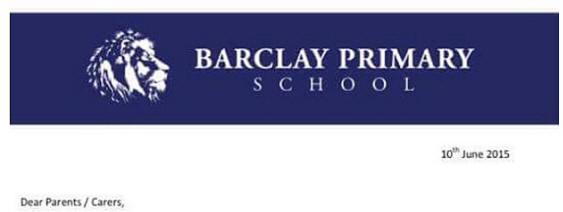
In a letter sent out on June 10, Barclay
Primary School in Leyton, east London, has
banned pupils from attending school if they
are fasting for Ramadan
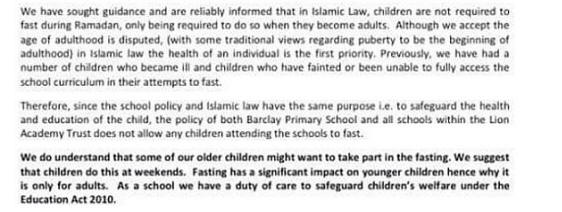
The letter, above, said that fasting has a
'significant impact on younger children' and
should be done at weekends

In the letter, the acting head went on to
say that children would not be 'considered
to be able to fast' without meeting with him
first
In the letter issued yesterday, the school
claimed to have 'sought guidance' before
implementing the ban.
'We are reliably informed that in Islamic
Law, children are not required to fast
during Ramadan, only being required to do so
when they become adults,' it said.
It continued to describe how children
'fainted' and 'became ill' during last
year's festival after going without food or
water for '18 hours, a significant amount of
time for a child.'
Alongside Barclay Primary School the ban
will be implemented across three other
schools which belong to the trust. They are
Sybourn Primary School and Thomas Gamuel
Primary School in Waltham Forest and Brook
House Primary School in Haringey.
The letter, posted on 5pillars, a British
Muslim publication, was today criticised by
members of the Muslim community which said
deciding whether a child should fast or not
is the prerogative of their parent.
The Muslim Association of Britain said there
were enough rules in place to protect the
vulnerable from fasting without school's
interference.
'We believe that there are sufficient and
stringent rules within Islam which allow
those who are unable to fast, to break
fast,' a spokesman told Mail Online.
'These rules include those who are medically
ill or compromised; or too young or too old
to fast.
|

Sybourn Primary
School in Waltham Forest, which also
belongs to Lion Academy Trust, will
abide by the same rule |
'However, we believe that this determination
should be decided by parents with their
children; who can together reach a
collective decision whether or not the child
can fast.
'MAB ascertains that the final choice of
whether or not to fast should be the right
of the parents, who should in turn encourage
their children to fast without forcing them
to do so.'
|

Pupils at Thomas
Gamuel Primary School (above) in
Waltham Forest will also not be
allowed to attend if fasting |
Dr Omer El-Hamdoon, the President of MAB
added parents ought to have the ultimate say
in whether their child participates in the
fast.
'Schools should play a supporting role to
parents; and issues like this should be
discussed, not blanket enforced,' he said.
Neither Barclay Primary School nor the Lion
Academy Trust responded to Mail Online's
requests for comment this afternoon.
An earlier version of this article stated
that Barclay Primary School had banned all
pupils from fasting during Ramadan. We are
happy to clarify that some pupils will be
allowed to fast but only with express
permission from the acting headmaster after
a meeting with their parents.
Source:
The Daily Mail UK
 Pakistani
Women’s Football Team Pakistani
Women’s Football Team
|
Shahlyla
Baloch
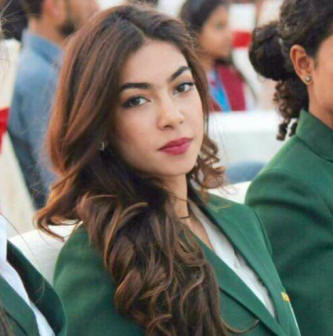
Shahlyla Baloch plays as
a striker for both Pakistan
national women's football
team and the Balochistan
United Team. She has
recently unlocked a big
achievement by joining the
Sun Club in Maldives where
she will be given
professional training. |
Source:
Parhlo
|
|
|
|
Q: Dear Kareema,
I find myself sitting at my desk working for
most of the day which has really affected my
posture. I’ve since started taking regular
breaks but was wondering if you can suggest a
particular exercise I can do to help improve my
posture?
A: Try incorporating yoga into your daily
routine. It focuses on deep muscle work –
lengthening, strengthening and breathing
naturally through different poses.
Not only will this
aid in better posture, you’ll feel longer and
stronger as the weeks go by.
Focus on core exercises - this will help
strengthen your back:
 Try sitting on a big gym ball instead of a chair
every other day
Try sitting on a big gym ball instead of a chair
every other day
 Opt for a ‘standing station’ – high desk where
you can stand and work for set periods during
the day
Opt for a ‘standing station’ – high desk where
you can stand and work for set periods during
the day
 Always be conscious of your posture – stand/sit
up tall, roll shoulders up, back and down
towards your spine
Always be conscious of your posture – stand/sit
up tall, roll shoulders up, back and down
towards your spine
|
|

TOGETHER, LET’S FIGHT
GLOBESITY
Kareema
My Health and Fitness
Tel: 0404 844 786
|
|
|
Need an answer to a
fitness related matter?
Send your question to
Kareema at
fitness@crescentsofbrisbane.org.
All questions sent in
are published here anonymously and without any
references to the author of the question. |
|
|
|
The CCN Book of the Week
What is a Madrassa
by
Ebrahim Moosa
Edinburgh University Press, 2015, 290.
Review by Adis Duderija
Ebrahim Moosa, a leading theoretician behind
critical/progressive Muslim thought and a graduate of the
‘alimiyya program at Dar ulUlum, Nadwatul Ulama, Lucknow, in
the early 1980, has gifted us with a much needed, personal
account and a compassionate yet critical analysis of the
network of some major South Asian madrassas, their
intellectual history, curriculum, their role in contemporary
(S. Asian) Islam and the kind of worldviews inhabited by
those who are involved in their every-day operations.
The book discusses a number of
crucial topics ranging from an analysis of what constitutes
‘knowledge’ and its purpose in these traditional
institutions of learning with a long history and the ongoing
debates regarding their relevance and reform to their
alleged links with terrorism in the wake of the ‘war on
terror’.
The book is divided into four parts consisting of a total of
twelve chapters. The first part titled “Lived Experience”
(chapters one to three) recounts his days at the various
madrassas he attended offing us a humane and at times funny
description (e.g. discussion of young adult madrassa
students’ reaction to definition of marriage “as sexual
enjoyment” in strictly segregated Muslim communities) of
madrassa life(including prayers, types of food eaten,
extra-curricular activities and what constitutes knowledge)
from that of a novice to that of an aspiring scholar.
In the second section of the
book, “History and Contexts” (chapter four to six), Moosa
offers us an illuminating description of the birth of the
contemporary madrassas in S.Asia and their historical cum
intellectual genealogy. Moreover, the reader learns about
the major scholars, texts and subjects used in the madrassa
curriculum and the various phases of its development.
Importantly, Moosa also discusses the hotly debated topic of
curriculum reform both in the context of madrassa
administrators themselves and their external critics
offering his own perspective on the issue.
In the third part bearing the
title “Politics of Knowledge”( chapters seven and eight) the
author documents how people who are part of the madrassa
educational system view themselves as purveyors and
embodiments of the life and the teachings of the Prophet (“Sunna”/maslak)
through an intensive study and internalization of the
practices and values ( including strict and all-encompassing
gender segregation) considered to fall under the aegis of
Sunna. Here Moosaalso provides us with glimpses of what goes
on in female madrassas including the kind of curriculum they
study. Because of the strict gender segregation rules, the
insights on the life of female madrassas are recounts of
what his former female graduate student from Pakistan
gathered. In terms of curriculum content, Moosa notes a
recent significant shift in the emphasis on the study of the
hadith as a core of the curriculum and notes its
implications that perhaps best echo the major approach the
author takes in relation to the role and function of
madrassas in S.Asia in contemporary Muslim societies:
The absence of an updated and
robust rationalist dialectic blended with a Sunna- centered
approach to religious knowledge has only fomented an
exclusionary faith- centered or hidebound received tradition
centered mindset. This mindset generates extraordinary
hurdles and roadblocks for religious discourse to engage
with the challenges of the time. Institutional reforms,
without substantive intellectual reformation, tend to yield
fewer discursive dividends but a surfeit of
apologetics.(p.175)
Moosa also revisits the issue of
knowledge and contestations over its meaning and nature from
the perspective of the traditional, as advocated by most of
those who administer the madrassas, and modern approaches.
Here Moosahighlights the utmost importance madrassa
administrators place on the process of embodiment of
knowledge through practice as avenue of reaching true piety
as the noblest goal of the madrassa curriculum.
In the fourth, final part titled
“Madrassas in Global Context” (chapters nine to twelve)
discusses the negative and often ill-informed media coverage
madrassas in S.Asia get by being unintelligently and
unfairly conflated with Al-Qaeda, Taliban and their ilk.
Moosa considers these views to be “gross distortions”
(p.218) of reality. The author also ponders over the future
of the madrassas and the career options of their graduates.
In this fourth section one of
the most important and unique features of the book, in the
mind of this reviewer, is to be found, namely the letters
Moosa writes to both policy makers in the west as well as
his former madrassa teachers about the future of the
madrassas and their potential role as important institutions
for intercultural understanding between the two worlds
Moosa’s interlocutors represent.
This important book, therefore,
grapples with a large number of complex questions that
pertain to the very core of the nature and role of Islam and
its over millennia old tradition in today’s world. These
include, among the most prominent others, the very question
of the contested nature of the concept of Islamic
traditionand knowledge itself and what it means to be a
Muslim, the nature of religious authority at the time of its
unprecedented fragmentation, issues pertaining to the nature
of Islamic ethics, gender relations, Islam and politics and
Islam and (post)-modernity in general.
The book also contains helpful
summaries of major historical concepts, religious doctrines
and teachings of Islam and as such can be used in
introductory courses on Islam, especially those which focus
on Islamic education.
Consistent with his other
writings,Moosa effortlessly combines a deep knowledge of the
Islamic tradition with that of equallydeep ‘secular western’
tradition to skillfully navigate and guide us through major
concepts and topics under discussion.
While Moosa astutely diagnoses
the problems and challenges of the educational systems of
the madrassas as needing to incorporate contemporary
knowledge from a variety of disciplines perhaps one aspect
that did not get as much attention as this reviewer
considers warranted is the need for madrassas to develop
alternative interpretational approaches within the confines
of the classical Islamic sciences in order to break away
from dogmatic positions that were established many centuries
ago and which are making them a source of continued Muslim
intellectual stagnation. For example, the emphasis on
contextualization of the Qur’an and Sunna beyond the
classical disciplines asbabulnazul and/or naskhwamansukh or
indeed a re-examination of the very concept of Sunna in
traditional Islam.
This re-evaluation of the
intrinsic and internal hermeneutical mechanisms is, in this
reviewer’s mind, the most promising avenue for a meaningful
madrassa reform which builds further on the existing
strengths of the madrassas’ curriculum but conceptualizing
it through a different set of interpretational approaches
which are to a large extent, albeit in underdeveloped form,
readily available in the traditional sciences.
I highly recommend this book
especially to all those who are interested in Islamic
education and its reform as well as the question of reform
of Muslim thought in general.
Would you like
to see the cover of your favourite book on our book shelves
below?
Then simply email
the title and author to
thebookclub@crescentsofbrisbane.org
Double click a
book cover to find out what others think of the book
|
|
|
KB says: Here's
a raw, gluten-free, paleo, sugar-free dessert
that was prepared by Aakifah Suleman for a "0.5
year birthday party" and adapted from
here.
|
Raspberry Lemon Mini Vegan Cheesecakes
|

|
Ingredients
¾ cups raw macadamia
nuts
½ cup pitted dates
pinch of himalayan salt
1-3 tablespoons of water
Ingredients for
the cheesecake filling
2 cups raw cashews, soaked overnight in fridge
or for 1 hour in warm water at room temperature
(strain well after soaking)
½ cup coconut oil
¼ cup water
juice of 1 organic lemon + zest
½ cup rice malt syrup (or other sweetener)fresh raspberries for plating
|
Method
To make the crust: In a food processor,
pulse the macadamias until a fine grind forms. Add in the dates and pinch of salt.
Continue mixing and check with your fingers if
the mixture sticks in your fingers. If it’s too dry, add in water one
tablespoon at a time. Mix again. Once it sticks together and still falls off your
fingers – it’s perfect.
Using a cupcake pan
preferable a silicone one, press the mixture
into the bottom evenly and set aside.
To make the filling: Add all the ingredients
into a clean food processor again : strained
cashews, warm but not hot coconut oil, lemon
juice, lemon zest, rice malt syrup (or other
sweetener), water. Mix on high for about
5 minutes until a very smooth mixture forms.
Pour over the bases
in the cupcake pan. Tap the pan gently to let it
settle. Place straight into the freezer for
about 1-2 hours before serving. These defrost in
just about 5-10 minutes in the refrigerator, and
much faster at room temperature so give them
enough time to defrost slightly before serving.
Top with fresh raspberries to serve. Enjoy!
(If you want to keep
them frozen for longer and just have them ready
whenever the occasion calls for a great
impromptu dessert. Simply freeze for 1-2 hours,
then be sure to wrap the pan with plastic wrap
as tight as possible and return to the freezer
for up to 1 month.)
|
|
Do you have a recipe to share with CCN
readers?
Send in your favourite recipe to me
at
kbcooks@crescentsofbrisbane.org and be my "guest chef" for the week.
|
|
|
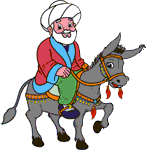
Jallaludin: I have all four of my sons living at home with
me.
Habibullah: You are so lucky. What jobs do they do?
Jallaludin: The first one qualified as an engineer, the
second has an MBA, the third received his PhD last year, and
the fourth turned out a thief.
Habibullah: Why don't you throw your fourth son out of the
house?
Jallaludin: He is the only one bringing any money into the
house. The rest are jobless! |
|
|
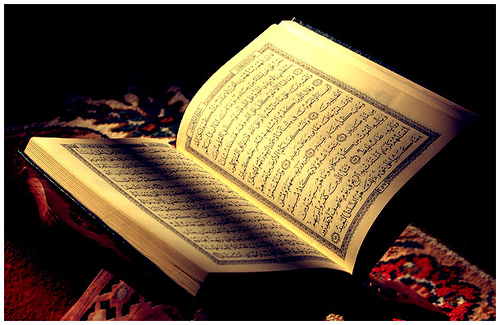
O you who believe! Do your
duty to Allah, seek the
means of approach to Him,
and strive with might and
main in His cause: that you
may prosper.
~ Surah Al-Ma'idah 5:35 |
|
The CCN

Two things to remember
on life:
1. Take care of your
thoughts when you
are alone.
2. Take care of your
words when you are
with people.
~ Anon |
|
|
Notice Board
|
 |
Click on thumbnail to
enlarge |

|
(provisiona
"If
it's not here ....it's not happening!"l)
To
claim your date for your event email
ccn@crescentsofbrisbane.org.
|
Date |
Day |
Event
(Click on link) |
Organizer |
Venue |
Contact |
Time |
|
18 June |
Thursday |
1st Ramadaan 1436 |
|
20
June |
Saturday |
Algester After Traweeh BBQ |
Islamic Society of Algester |
Algester Mosque, 48 Learoyd Road |
0401 576 084 |
After Taraweeh |
|
22
June
(NOTE
DATE CHANGE) |
Monday |
Logan Mosque OPEN DAY |
Islamic Society of Logan Mosque |
269 Third Avenue, MARSDEN |
0406 914 631 |
1.30pm to 4.30pm
(NOTE TIMES CHANGE) |
|
27
June |
Saturday |
Algester After Traweeh BBQ |
Islamic Society of Algester |
Algester Mosque, 48 Learoyd Road |
0401 576 084 |
After Taraweeh |
|
4
July |
Saturday |
Algester After Traweeh BBQ |
Islamic Society of Algester |
Algester Mosque, 48 Learoyd Road |
0401 576 084 |
After Taraweeh |
|
11 July |
Saturday |
Algester After Traweeh BBQ |
Islamic Society of Algester |
Algester Mosque, 48 Learoyd Road |
0401 576 084 |
After Taraweeh |
|
14 July |
Tuesday |
Lailatul Qadr - Night of Power 1436 (27th Ramadaan
1436) |
|
18 July |
Saturday |
Eidul Fitr 1436 (1st Shawwal 1436) |
|
25
July |
Saturday |
Eidfest |
Eidfest QLD |
Rocklea Showgrounds |
0418 722 353 |
All day |
|
1
August |
Saturday |
Fund Raiser & Eid Celebration |
Islamic Society of Ipswich |
Islamic College of Brisbane, KARAWATHA |
0421 976 934 |
6.30pm |
|
8
August |
Saturday |
School Fete |
Australian International Islamic College |
Blunder Rd, DURACK |
3372 1400 |
TBA |
|
15
August |
Saturday |
Gala Dinner in
A Tribute to Women |
Queensland Muslims & Muslim Charitable Foundation |
Brisbane Technology Park |
0402 575 410 |
6pm |
|
22
August |
Saturday |
NEW Musjid Al Huda Redbank |
TBA |
TBA |
TBA |
after Maghrib |
|
6
September |
Sunday |
CresWalk2015 |
Crescents of Brisbane |
Orleigh Park, WEST END |
0402 026 786 |
9am -12pm |
|
12
September |
Saturday |
Amanah Institute Fundraising Dinner |
Amanah Institute |
TBA |
TBA |
TBA |
|
24 September |
Thursday |
Eidul Adha 1436 (10th Zilhijja 1436) |
|
26
September |
Saturday |
Eidfest |
Eidfest @ Dreamworld |
Dreamworld |
0418 722 353 |
Evening |
|
3
October |
Saturday |
Eid Lunch |
Australian International Islamic College |
Blunder Rd, DURACK |
3372 1400 |
TBA |
|
15 October |
Thursday |
Muharram 1437 – Islamic New Year 1437 (1st Muharram
1437) |
|
PLEASE NOTE
1. All Islamic Event dates given above are tentative and
subject to the sighting of the moon.
2. The Islamic date changes to the next day starting in
the evenings after maghrib. Therefore, except for Lailatul
Mehraj,
Lailatul Bhahraat
and
Lailatul Qadr – these dates refer to the commencement of the event
starting in the evening of the corresponding day. |
RECURRING EVENTS
|
Algester Mosque
Zikrullah program every Thursday night after
Esha
For more details, contact: Maulana Nawaaz: 0401576084
|
|
Brisbane Northside Muslimahs Support Group
To help sisters on the northside of Brisbane to connect
with their local sisters.
We
will endeavour to have regular meetings, either for a
lesson/discussion on
Islam, or for social events.
Please contact :
Ayesha on 0409 875 137 or at
ayesha_lea@yahoo.com.au
Facebook :
https://www.facebook.com/donna.lewis.564
|
|
IPDC

|
|
Lutwyche Mosque
Weekly classes with Imam Yahya
Monday: Junior Class
Tuesday: Junior Arabic
Friday: Adult Quran Class
For more information call 0470 671 109
|
|
Holland Park Mosque
|
All programs are conducted by Imam
Uzair Akbar |
|
DAY
MONDAY
TUESDAY
|
PROGRAM
Tafseer Program
Basics of Islam
Tafseer Program |
AUDIENCE
Men
Ladies |
TIME
after Maghrib Salat |
|
|
Taleem Programe at Kuraby Mosque
Every Thursdays 10.30-11.30am
|
|
Bald Hills Mosque Weekly Tafseer
|
Day |
Event |
Time |
|
Monday |
Madina Arabic Course
(Urdu) |
after Isha |
|
Tuesday |
Madina Arabic
Course (Urdu) |
after Isha |
|
Sunday |
Joula |
after Maghrib |
|
Sunday |
Biyaan |
after Isha |
|
|
The Tafseer gets recorded and uploaded on to our website end
of each week, please visit our website to download these
recordings at
www.masjidtaqwa.org.au.
The Monday and Tuesday's Madina Arabic Course is in Urdu.
These sessions too are recorded as well as webcasted live.
For webcast details please contact us via our website
“contact us” page. The recordings are sent via a download
link, if you are interested please again contact us via our
website “contact us” page.
|
|
Queensland Police Service/Muslim
Community Consultative Group
Meeting Dates & Times
Time: 7.00pm sharp
Date: TBA
Venue: Islamic College of Brisbane - 45 Acacia Road
Karawatha
Light refreshments will be available.
ALL WELCOME
For more information and RSVP:
Sergeant Jim Bellos at
Bellos.Dimitrios@police.qld.gov.au
|
|
Tafsir & Islamic History Classes
VENUE: Al-Mustapha Institute of Brisbane, 39
Bushmills Court, Hillcrest
Every Monday & Wednesday
7pm - 8:15pm
All Brothers & Sisters are welcome.
For further information please contact Moulana Noor 0432 712
546. |
|
|
C atch
Crescents Community News
on
|

|
Please feel free
to click on the
image on the
left and......
 post comments on
our Wall
post comments on
our Wall
 start up a
Discussion
thread
start up a
Discussion
thread
 become a Fan
become a Fan
and
 Like our
page
Like our
page
|
|
|
|
 Sunnah Inspirations
Sunnah Inspirations
Providing information about
Islam - its beliefs,
culture, practices,
dispelling misconceptions
 Kuraby Mosque
Kuraby Mosque
 Holland Park Mosque
Holland Park Mosque
 Al-Nisa
Al-Nisa
Provide young Muslim women
in Queensland with support
and opportunities to express
themselves
 MUSLIMS AUSTRALIA /
Australian Federation of
Islamic Councils
(AFIC)
Islamic Schools, Halal
Services and a whole lot
more...
MUSLIMS AUSTRALIA /
Australian Federation of
Islamic Councils
(AFIC)
Islamic Schools, Halal
Services and a whole lot
more...
AFIC Schools
www.mfis.com.au (Malek
Fahd Islamic School, Sydney,
NSW)
www.icb.qld.edu.au
(Islamic College of
Brisbane, QLD)
www.icosa.sa.edu.au
(Islamic College of South
Australia, SA)
www.afic-lic.com.au
(Langford Islamic College,
Perth, WA)
www.islamicschoolofcanberra.act.edu.au
(Islamic College of
Canberra, ACT)
 Karratha Muslims
(Muslims in Western
Australia)
Karratha Muslims
(Muslims in Western
Australia)
 Islam TV
Islam TV
Recording of lectures and
events in and around
Queensland
 Muslim Directory Australia
Muslim Directory Australia
 Carers Queensland
Carers Queensland
Free service for
multicultural clients who
are carers, elderly and
people with disabilities
 Brisbane Muslim Burial
Society (BMBS)
Brisbane Muslim Burial
Society (BMBS)
 Muslim
Charitable Foundation
(MCF)
Muslim
Charitable Foundation
(MCF)
Coordinated collection &
distribution of: Zakaah,
Lillah, Sadaqah, Fitrana,
Unwanted interest
 Islamic Medical Association
of Queensland (IMAQ)
Islamic Medical Association
of Queensland (IMAQ)
Network of Muslim healthcare
professionals
 Al-Imdaad Foundation
(Australia)
Al-Imdaad Foundation
(Australia)
 Australian Muslim Youth
Network (AMYN)
Australian Muslim Youth
Network (AMYN)
Find out about the
latest events, outings,
fun-days, soccer
tournaments, BBQs organised
by AMYN. Network with other
young Muslims on the
AMYN Forum
 Islamic Council of
Queensland (ICQ)
Islamic Council of
Queensland (ICQ)
Umbrella body representing
various Mosques and
Societies in Queensland
Current
list of businesses
certified halal by ICQ
 7
August 2011 7
August 2011
 Islamic Friendship
Association of Australia
Islamic Friendship
Association of Australia
Blog of the Association's
activities
 United Muslims of Brisbane
United Muslims of Brisbane
 Crescents of Brisbane's
CRESCAFE
(Facebook)
Crescents of Brisbane's
CRESCAFE
(Facebook)
 Muslim Women's eNewsletter
Muslim Women's eNewsletter
Sultana’s Dream is a
not-for-profit e-magazine
that aims to provide a forum
for the opinions of
Australian Muslim women
 Islamic Solutions
Islamic Solutions
Articles and Audio
recordings
 IQRA Academy Institute of
Islamic Studies
IQRA Academy Institute of
Islamic Studies
Online streaming of Islamic
lectures
 Islamic Relief Australia
Islamic Relief Australia
 National Zakat Foundation
(NZF)
National Zakat Foundation
(NZF)
|
 Gold Coast Mosque
Gold Coast Mosque
Incorporating Islamic
Society of Gold Coast Inc.
 South African National
Halaal Authority
(SANHA)
South African National
Halaal Authority
(SANHA)
 Muslim Womens' Convert
Support Group
(MWCSG)
Muslim Womens' Convert
Support Group
(MWCSG)
Network of Muslim women
converts from the Brisbane
and Gold Coast areas of
Queensland.
 Australian International
Islamic College
(Durack)
Australian International
Islamic College
(Durack)
 Kotku Mosque - Dubbo NSW
Kotku Mosque - Dubbo NSW
 Islamic Society of Algester
Islamic Society of Algester
 Jamiatul Ulama Western
Australia
Jamiatul Ulama Western
Australia
Body of Muslim Theologians
(Ulama, Religious Scholars)
 Islamic Women's Association
of Queensland (IWAQ)
Islamic Women's Association
of Queensland (IWAQ)
Community based,
not-for-profit organisation
providing Settlement, Aged
Care, disability, social
activities and employment
opportunities.
 Federation of Australian
Muslim Students & Youth
(FAMSY)
Federation of Australian
Muslim Students & Youth
(FAMSY)
 Queensland Intercultural
Society (QIS)
Queensland Intercultural
Society (QIS)
 GIRU –
Griffith Islamic Research
Unit
GIRU –
Griffith Islamic Research
Unit
Qld Stories link or
YouTube link
 Gold Coast Halal
Certification Services
(GCHCS)
Gold Coast Halal
Certification Services
(GCHCS)
 Muslim Aid Australia
Muslim Aid Australia
Serving
Humanity
 Human Appeal International
Australia
Always with you on the road
to goodness
Human Appeal International
Australia
Always with you on the road
to goodness
 Al-Mustapha Institute of
Brisbane
Al-Mustapha Institute of
Brisbane
Preserving the Past,
Educating the Present to
Create the Future
 Islamic Society of Darra
Islamic Society of Darra
 Qld Muslims Volunteers
Qld Muslims Volunteers
 Islamic Shia Council of
Queensland
Islamic Shia Council of
Queensland
 Muslim Reverts Network
Muslim Reverts Network
Supporting new Muslims
 Muslim Funeral Services
(MFS)
Muslim Funeral Services
(MFS)
Funeral Directors & Funeral
Fund Managers for the
Brisbane and Gold Coast
communities
 Islamic Society of Bald
Hills (ISBH) :
Masjid Taqwa
Islamic Society of Bald
Hills (ISBH) :
Masjid Taqwa
Tafseers and Jumma Khubahs
uploaded every week.
 Muslim Community & Qld
floods
Muslim Community & Qld
floods
How the community helped out
during the 2010 QLD floods
 The CCN Young Muslim Writers
Award
(Facebook)
The CCN Young Muslim Writers
Award
(Facebook)
 The Queensland Muslim
Historical Society
(Facebook)
The Queensland Muslim
Historical Society
(Facebook)
 Muslim Women's National
Network of Australia, Inc
(MWNNA)
Muslim Women's National
Network of Australia, Inc
(MWNNA)
Peak body representing a
network of Muslim women's
organisations and
individuals throughout
Australia
 Sultana's Dream
Sultana's Dream
Online magazine
subscribe@sultanasdream.com.au
 Lockyer Valley Islamic
Association
Lockyer Valley Islamic
Association
 Eidfest
Eidfest
Celebrating Muslim cultures
 AYIA Foundation
AYIA Foundation
Charity
 Slackscreek Mosque
Slackscreek Mosque
Mosque and Community Centre
|
If you would like a link to your website
email
ccn@crescentsofbrisbane.org.
|
|
Disclaimer
Articles and
opinions appearing in this newsletter do not necessarily
reflect the opinions of the Crescents of Brisbane Team, CCN,
its Editor or its Sponsors, particularly if they eventually
turn out to be libellous, unfounded, objectionable,
obnoxious, offensive, slanderous and/or downright
distasteful.
It is the usual policy of CCN to
include from time to time, notices of events that some
readers may find interesting or relevant. Such notices are
often posted as received. Including such messages or
providing the details of such events does not necessarily
imply endorsement of the contents of these events by either
CCN or Crescents of Brisbane Inc.
|
|
|
Write For Us
The best ideas
and the best feedback come from our community of readers. If you
have a topic or opinion that you want to write about or want
seen covered or any news item that you think might be of benefit
to the Crescents Community please e-mail
ccn@crescentsofbrisbane.org.
Share your
thoughts, feelings and ambitions for our community through CCN.
If there is
someone you know who would like to subscribe to CCN please
encourage them to enter their details
here.
|
|
|




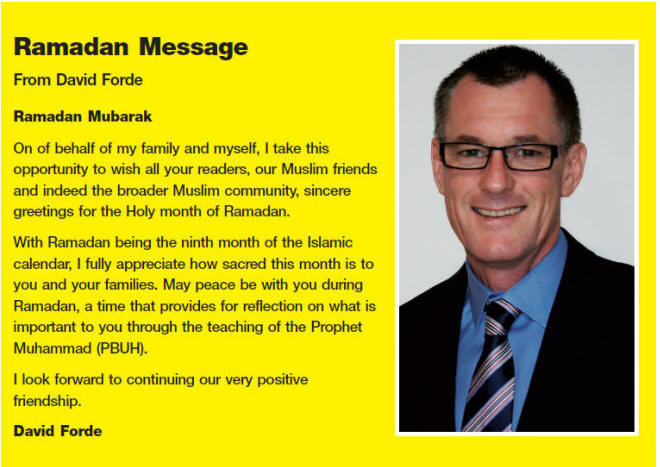








 A
Federal Liberal MP is
worried about the level of
racism towards Muslims in
Australia and says it must
be tackled to curb violent
extremism.
A
Federal Liberal MP is
worried about the level of
racism towards Muslims in
Australia and says it must
be tackled to curb violent
extremism.
